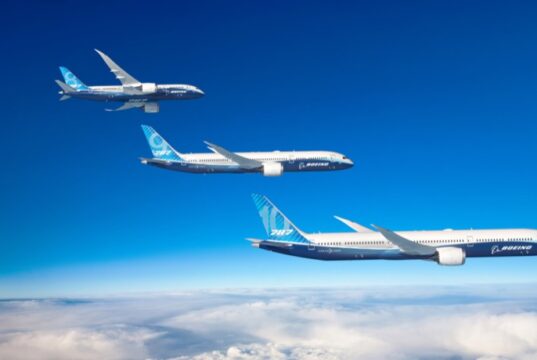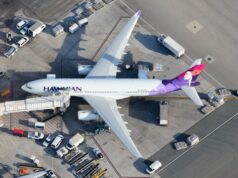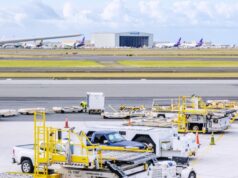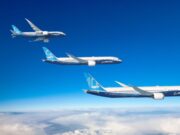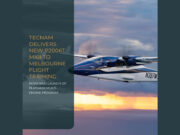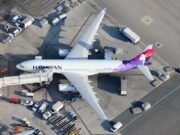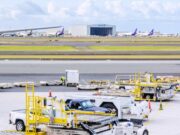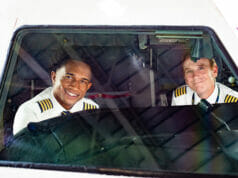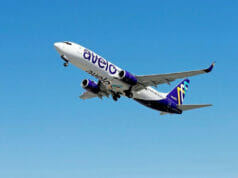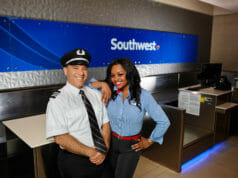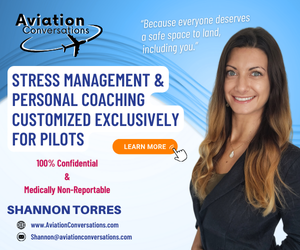

By Shannon Ledwich
Delta is marking a major milestone in the place it has now called home for three quarters of a century. The airline’s move to Atlanta on March 1, 1941, fueled Delta’s growth from a regional carrier to the world’s second-largest airline. At the same time, Delta’s climb helped transform the city and region into an economic and cultural powerhouse.
Delta employs tens of thousands of Georgians – it’s among the state’s top private employers – and contributes millions of dollars and countless employee volunteer hours to charities and organizations throughout the Atlanta metro area.
“Delta’s success and Atlanta’s success have been intertwined for 75 years,” said Ed Bastian, Delta’s President and incoming CEO. “Key to this success has been the historic partnership between Delta, the city of Atlanta, the state of Georgia and our thousands of Atlanta-based employees and customers.”
Gov. Nathan Deal said Delta’s economic impact on Georgia has been enormous.
“Georgia has a longstanding and highly successful partnership with Delta Air Lines that has helped both of us grow and flourish over the past 75 years,” said Deal. “The massive economic impact and multitude of jobs Delta has provided to Georgians have been critical to the state’s prosperity. We are proud the world’s second-largest airline calls Georgia home and look forward to this excellent corporate citizen reaching even greater heights.”
Delta was a small carrier focused on the Southeast – its slogan was “The Airline of the South”- when its founder, C.E. Woolman, moved its headquarters from Monroe, La., to Atlanta 75 years ago. It was a decision that would link Delta and Atlanta – altering the course of both – forever.
In 1941, Delta was awarded a major route expansion from Atlanta northward to Knoxville, Tenn., and Cincinnati, and to Savannah southward. At the time, Atlanta’s mayor, William B. Hartsfield, was working on extensive improvements to the city’s airport, Candler Field, in an effort to turn it into a major aviation center.
Realizing the potential the city’s location and ambition presented to further the young airline’s growth, Woolman and Hartsfield agreed for the city to lease land to Delta for $2,500 a year and provide $50,000 to help build Hangar One and attached office building, which cost a total of a $127,250. Hangar Two was built a few years later.
Today, those original aircraft maintenance hangars are home to the Delta Flight Museum. In 2011, the location was designated a Historic Aerospace Site.
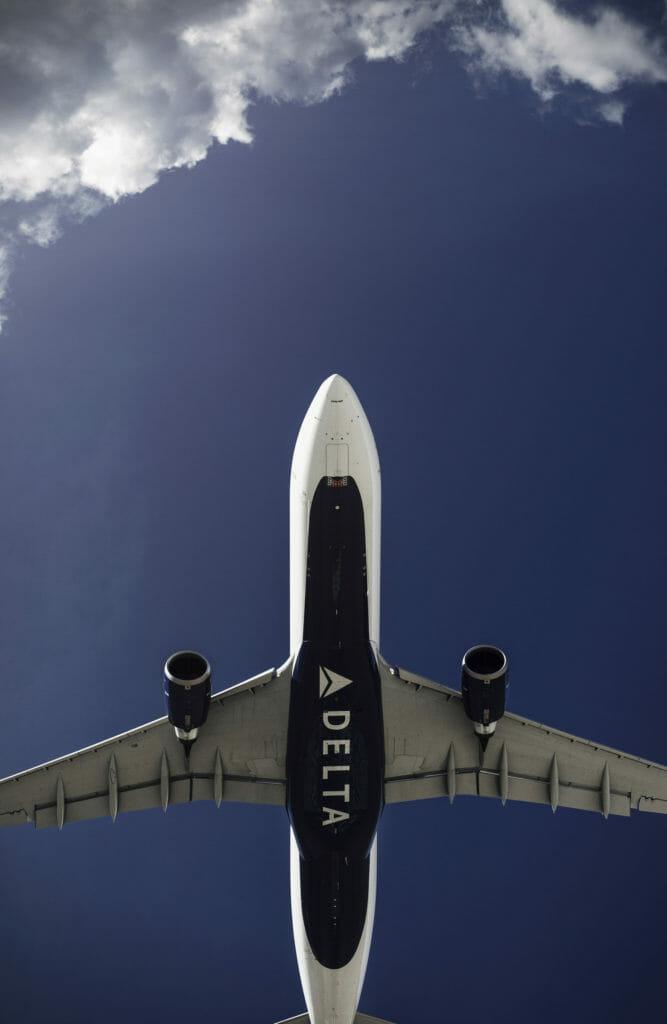
In the last 75 years, Atlanta has blossomed into an international city that’s home to major sports teams, world-renowned research facilities, Fortune 500 companies, the recent film industry boom that’s earned it the nickname “the Hollywood of the South” and the world’s busiest airport by passenger volume.
Now with more than 30,000 Delta employees based in Atlanta, the airline’s main hub of Hartsfield-Jackson Atlanta International Airport is estimated to pump $65 billion into the local economy.
“For the past 75 years, Delta Air Lines has been a leader in the global aviation industry, and we are proud to have them as our hometown carrier,” said Hartsfield-Jackson General Manager Miguel Southwell. “As the first airport in the world to serve more than 100 million passengers, Delta’s success and support have been instrumental in making Hartsfield-Jackson Atlanta International Airport the world’s most traveled and most efficient airport.”
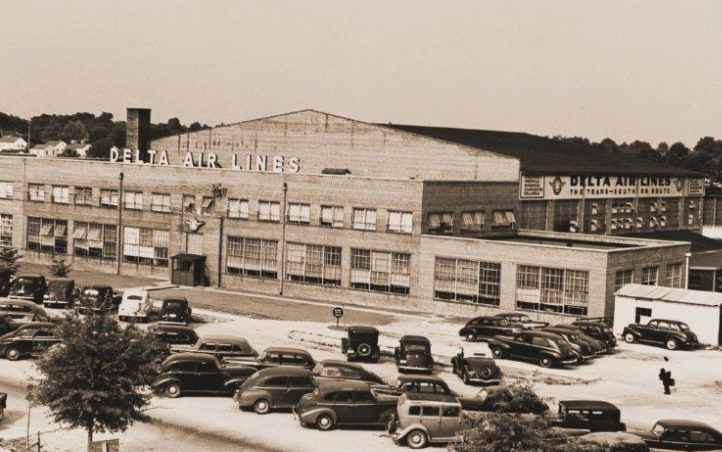
Delta also plays an important role in its hometown community, contributing to numerous organizations, including the Atlanta Business League, the Atlanta Community Food Bank, Children’s Healthcare of Atlanta, Covenant House of Georgia, Habitat for Humanity International, Junior Achievement, KaBOOM!, Marine Toys for Tots, Metro Atlanta Chamber, the National Center for Civil and Human Rights, the United Way of Greater Atlanta, the Woodruff Arts Center and the YMCA.
For example, Delta employees have built more than 230 Habitat houses in metro Atlanta during the past 14 years. And just last year, Atlanta employees donated 4,435 pints of blood to the American Red Cross, helping Delta become the sixth-largest corporate donor in the U.S.
Delta and The Delta Foundation also sponsor key higher education institutions including Georgia Tech, Georgia State and the University of Georgia, as well as scholarships at Morehouse College, Spelman College and Clark Atlanta University.
Continuing to raise the bar on its seven decades of success, Delta flew into the history books with a record-breaking 2015. Last year, the airline reported a historic pre-tax profit of $5.9 billion and led the industry in operational excellence with a record 214 days with zero domestic mainline cancellations and a strong on-time rate of 85.9 percent.
Last month, Delta gave its employees $1.5 billion in profit sharing, the largest bonus payout in U.S. history – including $540 million in metro Atlanta alone. And just last week the airline pledged to donate 1 percent of net income to charities around the world.
“Delta’s brand is synonymous with Georgia, and after 75 years, we are prouder than ever to have Delta’s headquarters in our state,” said U.S. Sen. Johnny Isakson, R-Ga. “Delta’s corporate citizenship is a great asset to our state and I look forward to seeing what the next 75 years bring.”
Delta Air Lines serves nearly 180 million customers each year. Delta was named to FORTUNE magazine’s top 50 World’s Most Admired Companies in addition to being named the most admired airline for the fourth time in five years. Additionally, Delta has ranked No.1 in the Business Travel News Annual Airline survey for an unprecedented five consecutive years. With an industry-leading global network, Delta and the Delta Connection carriers offer service to 327 destinations in 57 countries on six continents. Headquartered in Atlanta, Delta employs nearly 80,000 employees worldwide and operates a mainline fleet of more than 800 aircraft. The airline is a founding member of the SkyTeam global alliance and participates in the industry’s leading trans-Atlantic joint venture with Air France-KLM and Alitalia as well as a joint venture with Virgin Atlantic. Including its worldwide alliance partners, Delta offers customers more than 15,000 daily flights, with key hubs and markets including Amsterdam, Atlanta, Boston, Detroit, Los Angeles, Minneapolis/St. Paul, New York-JFK and LaGuardia, London-Heathrow, Paris-Charles de Gaulle, Salt Lake City, Seattle and Tokyo-Narita. Delta has invested billions of dollars in airport facilities, global products and services, and technology to enhance the customer experience in the air and on the ground.
This content originally appeared on the Delta News Hub on March 1, 2016.
U.S.A. Route Map as of March 2016
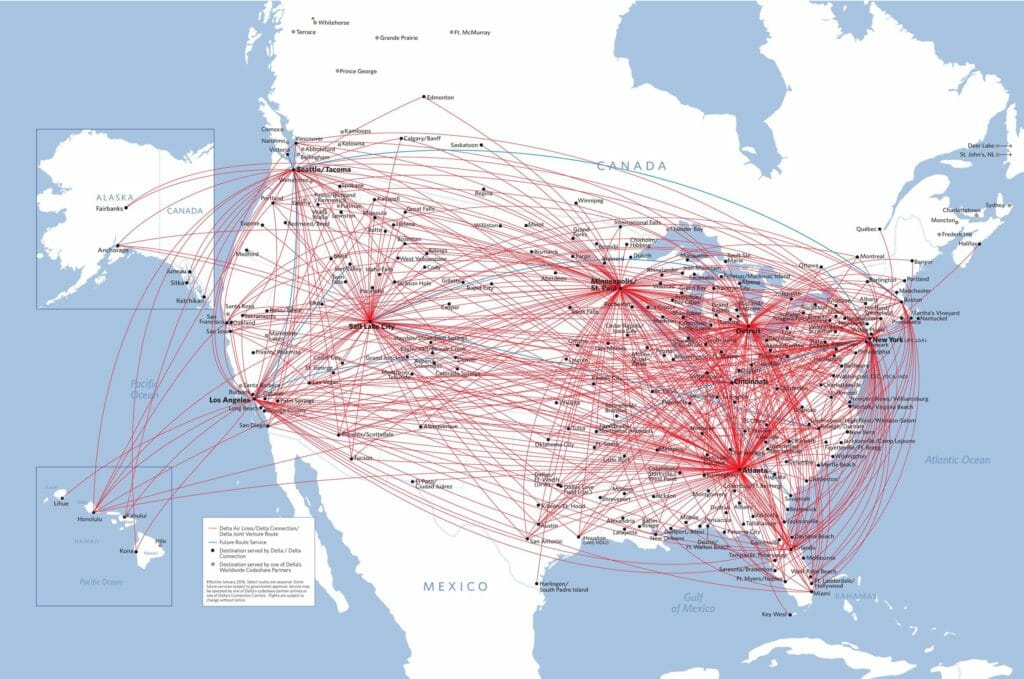
Europe Route Map as of March 2016
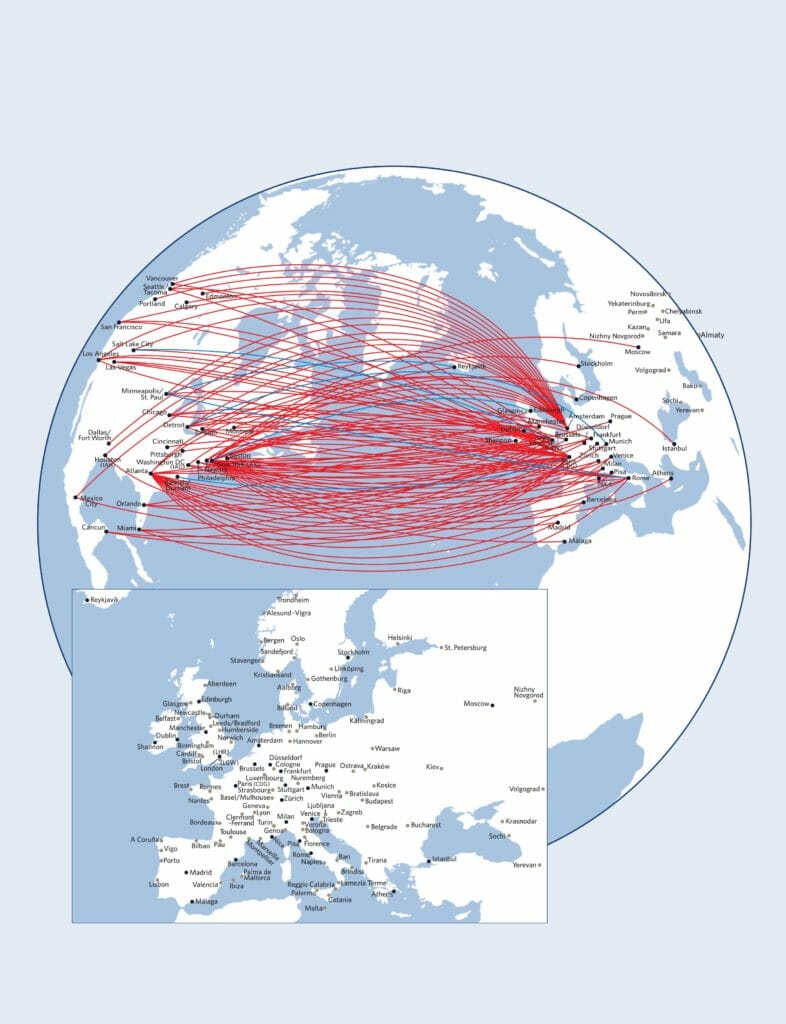
Latin America Route Map as of March 2016
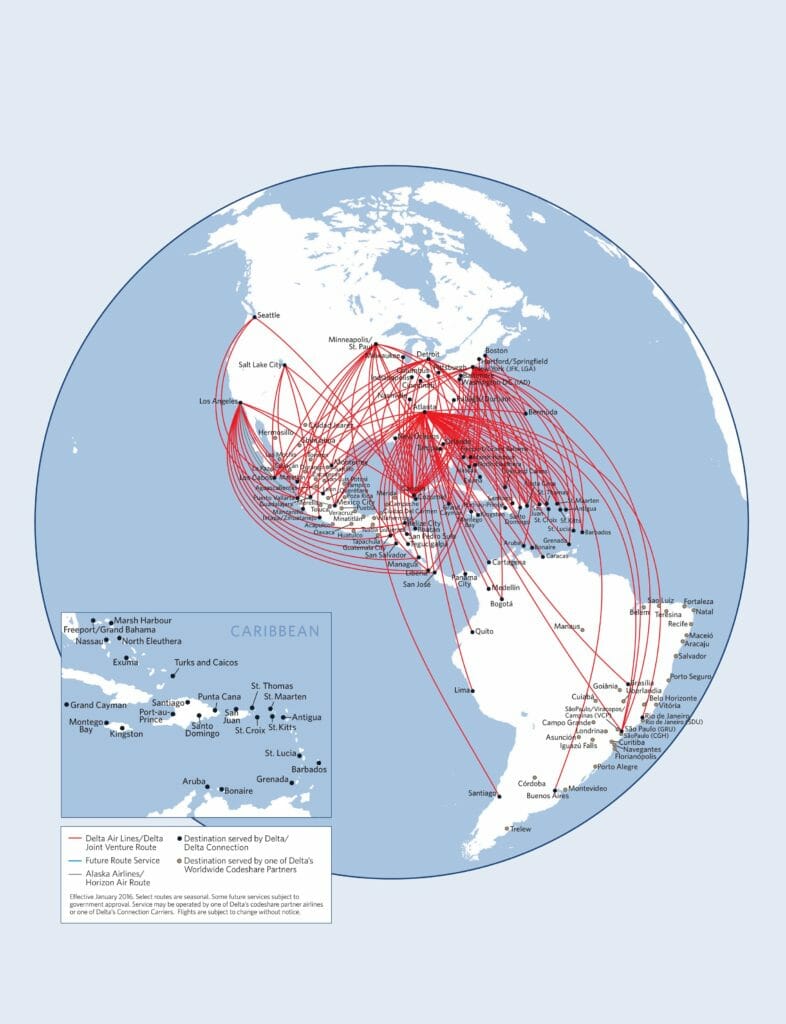
Asia Route Map as of March 2016
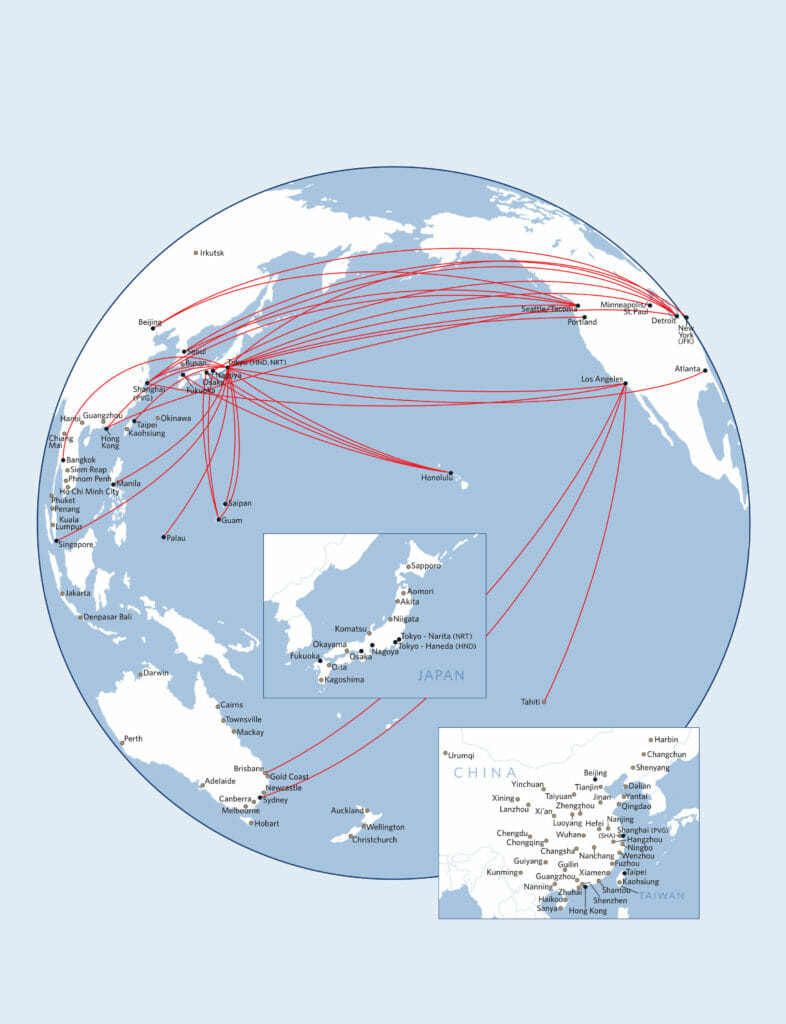
Africa & Middle East Route Map as of March 2016
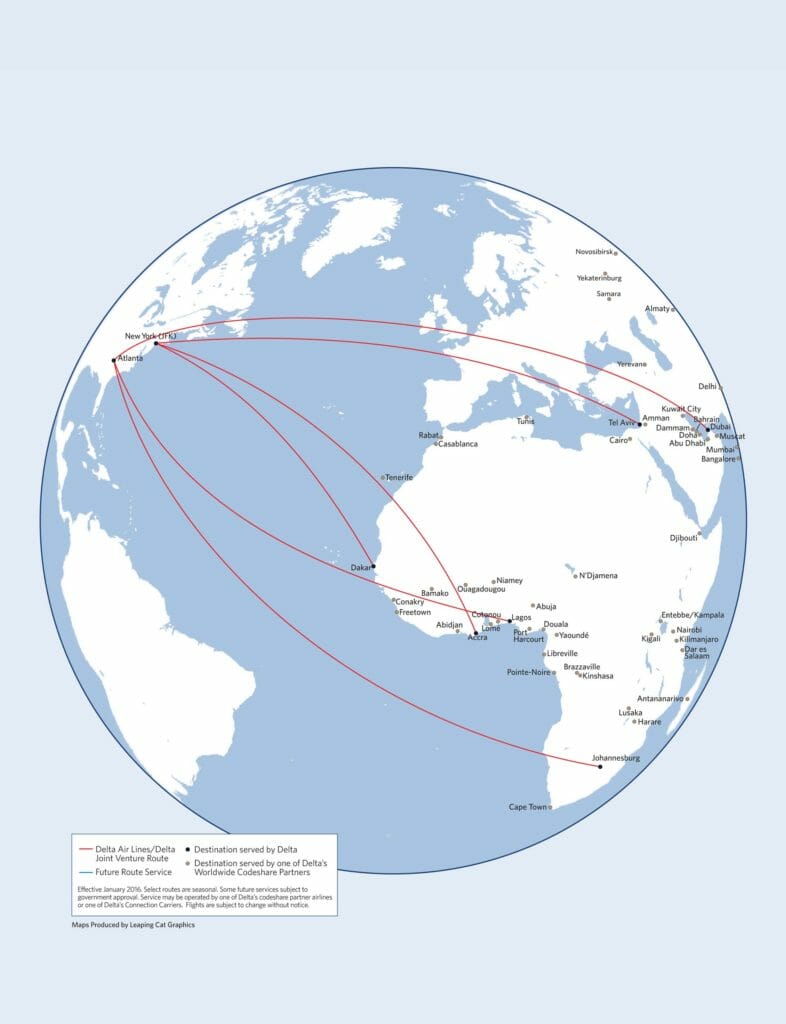
Interview with A.W. “Arnie” Kraby,
Manager – Pilot Selection
Pre Interview:
Craig: How do you select applicants to be brought in for an interview?
Arnie: All applications are accomplished online via the AirlineApps.com web site. We select applications to review by several methods. These include an initial computer based screen to ensure compliance with our minimum qualifications, a random application search by our Application Review Team, recommendations from current or retired Delta employees and pre-interview screening by our Pilot Selection Recruiting Team at various job fairs and conventions such as Women in Aviation International (WAI), the Organization of Black Aerospace Professionals (OBAP) and the National Gay Pilots Association (NGPA).
C: Can you explain the point system associated with online application process and what types of things count for points?
A: Once a candidate’s application has been selected for review through the process listed above, the online application is reviewed and scored by two separate Delta pilots. We do not use computer scoring except to ensure that a candidate meets or exceeds all of our employment criteria. Our pilot review team evaluates and scores the elements that we believe are most indicative of a highly motivated and competent pilot who will be capable of excelling as a Delta Air Lines pilot and leader. The areas that we evaluate in this application review are:
- Education
- Flight training record including all checkrides and FAA events
- Flight experience and progression
- Employment experience
- Accuracy and completeness of the entire application
At the conclusion of this review we invite the most competitive candidates to participate in the interview process at our World Headquarters in Atlanta, Georgia.
C: What can an applicant do to increase their chances of being called for an interview?
A: The most effective action every candidate can take is to ensure the accuracy and completeness of their AirlineApps application. Candidates should thoroughly review all entries on their application and then ensure that the application is updated as necessary to ensure its continued accuracy. As a minimum, active candidates must update their applications at least once every 60 days so that it remains current in our system. We also encourage candidates to print their application, review it themselves once again and then ask a close friend or relative to review it to ensure its accuracy. (Note: there is no spell checker in AirlineApps but candidates may cut and paste responses using MS Word to ensure correct grammar and spelling.)
C: How critical is it to attend a job fair to get an interview?
A: Attendance at conventions such as WAI, OBAP or NGPA provide opportunities for candidates to become known to our recruitment team and that frequently leads to an application review by our team of reviewers if the candidate meets or exceeds our employment criteria. We do not conduct interviews or application evaluations at any convention or job fair but we are able to assess whether or not a candidate meets or exceeds our employment criteria. If a candidate appears well qualified, they are recommended for an application review by our recruitment team. The review of a candidate’s AirlineApps application by our trained Delta pilot review team is the only process that we employ to determine if an applicant is selected for an interview invitation.
C: What is the best way to prepare for an interview with your company?
A: We provide a study guide and a list of reference material for each candidate when we send them an invitation to interview. In addition, we recommend that all candidates seriously consider why they want to become a Delta pilot since we realize that each airline has its own unique culture and operating philosophy in addition to fleet plans, route structure and pilot domiciles. Employment is a two way street and we want all of our employees to be enthusiastic about their career at Delta Air Lines. Our employee’s competence and enthusiasm fuels our success.
Interview:
C: Do you recommend that applicants get to your headquarters city the day before and get a hotel room for the night?
A:
Delta provides positive space roundtrip travel for all pilot applicants who travel to Atlanta from a domestic United States city where Delta provides scheduled service. It would be imperative for all out of town candidates to arrive in Atlanta on the day before their scheduled interview since they must report for their interview between 0715 and 0745 on the morning of the interview.
C:
Can you walk me through a typical day of interviews?
A:
The interview process begins as soon as the applicant arrives at the Pilot Selection office at Delta’s World Headquarters campus. Each candidate will be greeted by one of our Candidate Care Specialists who will collect all of their required records and invite them to check their posted schedule in the waiting area where they can also enjoy some Delta snacks, Starbucks coffee, tea or Dasani bottled water. At 0800 the candidates are welcomed by the Manager – Pilot Selection who briefs the candidates for the next 30 minutes on what to expect throughout the interview day. This briefing focuses on reducing the candidate’s stress level and on ensuring they understand exactly how the process will unfold, the elements of the interview and computer testing and what will be required to successfully receive a Conditional Job Offer (CJO) at the conclusion of the Day 1 process.
At 0830 all of the candidates begin either interviewing or testing. Half of the candidates will interview in the morning and half will complete the computer testing. The groups switch activities following lunch and they are all briefed on the results of their efforts around 1530.
The interview team is comprised of one Human Resources representative, one active Delta seniority list pilot and one retired Delta pilot. The computer testing has three parts which consist of a cognitive skills test, a personality test and a job knowledge test. All successful applicants are given a CJO and required to return the next day to accomplish the MMPI psychological test and complete an interview with a psychologist.
C: What kind of questions can an applicant expect to be asked?
A: During the panel interview the team first engages the candidate in a discussion based on their application. They discuss the various elements of their education, flight training and experience and their employment history with an emphasis on all aviation employment. Following this discussion the panel interviewers ask a series of aviation related situational and behavioral questions designed to determine a candidate’s ability to exercise good judgment, provide leadership and make sound decisions concurrent with the safety of the flight.
C: What are some of the biggest mistakes that applicants make during the interview process?
A: Candidates should focus on the questions being asked and use their knowledge, training and experience to provide the most articulate answers to the panel’s questions. Gouged answers are rarely effective responses due to overuse, lack of originality, and the inability of the candidate to respond to follow-up questions which are a primary tool employed by the panel to determine the independent thinking, judgment and decision making capabilities of the candidate.
Written test:
C: Is there a written or computer test?
A: There is a three part computer based test. The tests include a cognitive skills test, psychological test and an aviation related job knowledge test.
C: What can you recommend applicants study for that test? At what point is this test taken?
A: The computer testing takes approximately 2 ½ hours to complete and is accomplished either during the morning or afternoon of the Day 1 interview process. The only test that candidates can effectively prepare themselves for is the job knowledge test. We provide an outline of the subject areas included in the test and a list of reference materials which the candidates may use to prepare for this test when we send them the invitation to interview.
Simulator Evaluation:
C: Do you have a simulator ride?
A: No
Post Interview:
C: Do you tell applicants they are hired in person that day?
A: Yes, at the conclusion of the Day 1 interview and computer testing process the Manager – Pilot Selection personally meets with every candidate to either award a Conditional Job Offer (CJO) or explain to the candidate which portion of the process, interview or testing, was not successful. Successful Day 1 candidates who are awarded a CJO are required to return for our Day 2 testing which includes completing the MMPI test and a face to face interview with a psychologist. A candidate is required to successfully complete both the Day 1 and Day 2 process to be eligible for employment as a Delta pilot.
C: How soon can an applicant expect a class date after being hired?
A: Candidates are normally offered a training class date within 60 sixty days of their CJO award although exceptions due to increased training demands or simulator availability may adjust this time frame in either direction.
General:
C: How many pilots does your airline expect to hire this year?
A: We anticipate hiring between 700-900 pilots in calendar year 2016. We anticipate the higher number due to increased aircraft purchases. In both 2014 and 2015 we placed in training over 900 new hire pilots.
C: Does Delta Air Lines have a pilot referral program?
A: Delta welcomes pilot referrals from all active or retired Delta employees. An employee referral will result in a candidate’s application being reviewed and evaluated by our Application Review Team however it does not guarantee an interview. Only candidates whose application review scores place them among our most competitive candidates are extended an invitation to interview. Employee referrals simply guarantee that a candidate’s application will be reviewed and evaluated!
C: Can you describe the career path program that Delta Air Lines has with Endeavor Air?
A: Pilots who are currently being hired by our subsidiary, Endeavor Air, are eligible for a guaranteed Delta interview after complying with all of Endeavor’s criteria and also Delta’s employment criteria. Pilots complying with these requirements will be invited to participate in the normal Delta pilot interview process.

































































